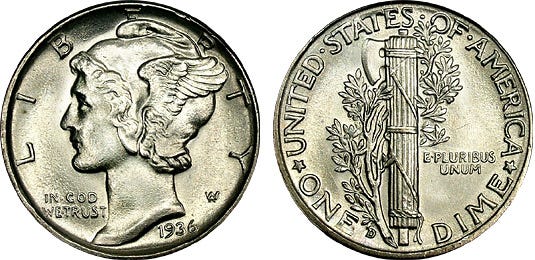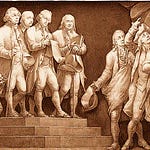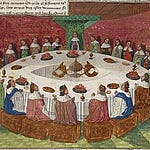Daffy Duck’s gotten swindled, trading a cow for a couple of beans which he tosses to the ground, into a rabbit hole, thinking that they’re worthless. Of course, everybody knows that when you trade a cow for beans, you get a beanstalk, and this one comes right up through the rabbit hole, with Bugs Bunny asleep in his bed, now towering up into the sky. Daffy, who is the Jack in the cartoon, climbs up, and wants to get at the Giant’s goods: “Doubloons,” he splutters, “and triploons, and quadru-p-ploons!” Bugs gets away from the Giant, but Daffy won’t give up, he says, “On account of I am greedy.” And there’s our Word of the Week, money in its proper sense, the product of minting. In fact, money and mint are doublets, the same word entering English at different times and from different directions, and thus assuming different forms.
See, back before the Romans conquered Britain up to Hadrian’s Wall — which still exists in places, as do many Roman walls in Germany and France and Italy and wherever the Romans went — the natives in England had no money. They might have silver and gold, but it wasn’t coined. In general, if one of those Germanic ancestors of ours made a big payment, he made it in the form of cattle: Old English feoh, a cousin of Latin pecus. And what do you know, the most ancient Romans too often bought things by livestock, and that’s where they got their word pecunia, payment, from which we’ve coined our word pecuniary. As for that word feoh, it’s got a near descendant in German Vieh, again meaning cattle, but in English it survives in its abstract sense, without any animals or their feeding troughs nearby: fee. Anyway, when the Romans came, they brought coins with them, of course, and so the Latin moneta, coin, entered English several hundred years before we get any writing in Old English, by which time the suffix was lost and the vowel was moved up front and raised: Old English mynt, which gave us English mint.
But then came William the French-speaking Viking in 1066, and all his fellow Normans who invaded England brought their language and their words with them. One of those words was this same Latin moneta, but by then it had undergone the changes we associate with French. For example, that t between two vowels fell away. Think of Latin pater, father, but French pere. So instead of Latin moneta, those Normans were saying muneie, pretty much like modern French monnaie, cash. That’s when that word took over, and fee was relegated to a narrower use. But mint stuck around, associated more closely with the making of coins: you mint them. Really, the idea of paper money is a kind of contradiction in terms, rather like bitcoin. Where’s the minting? We still weren’t done with moneta, though. Scholars in the nineteenth century wanted an adjective that meant “having to do with money,” so they went straight back to the Latin, with no vowel change, no loss of consonants, and coined monetary. There you’ve got them, three different English words from the same Latin source, 1800 years apart.
There are all kinds of English phrases with money in them. One of them, a run for your money, suggests to American ears that you’re being pressed by an opponent catching up with you from behind. “The Indians may be the best team baseball has ever seen,” somebody might have said in 1954, “but the Yanks will still give them a run for their money.” But apparently the phrase originally had to do with horse racing, in England. You went to the track, and maybe you put a little money on a horse or two, but you didn’t care too much whether you won or lost, because it would be fun in any case — you would get a run for your money. One of the profs in the electrical engineering department at Princeton used to be called Moneysworth, because whenever he gave the students a challenging assignment, he told them that it was good for them, as he wanted to give them their money’s worth. I do believe he meant it, too, and the students took it in a good-natured way. Of course, a lot of money phrases are pejorative, and rightly so, because the love of money is the root of all evil, and the pursuit of money as the great end of human life is to be as grubby as a pig but not as innocent. That’s why to call somebody “Moneybags” is to insult him. But don’t worry too much. He won’t have it for long, because, as people have been saying in English since at least the days of Shakespeare, “A fool and his money are soon parted!”

Listen to this episode with a 7-day free trial
Subscribe to Word & Song by Anthony Esolen to listen to this post and get 7 days of free access to the full post archives.











